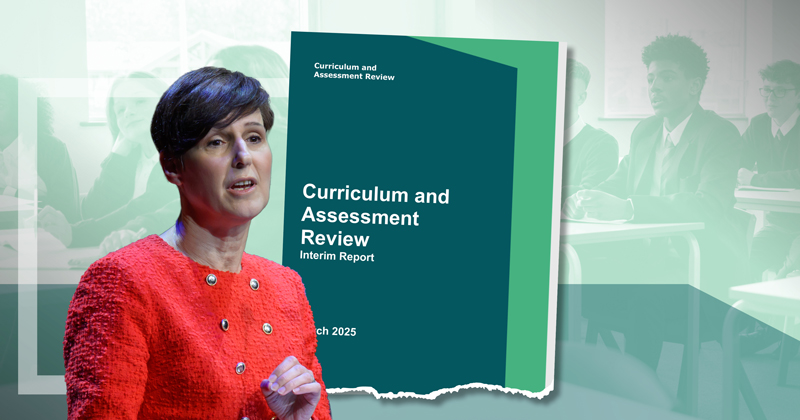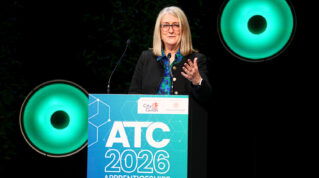Students who fail to pass GCSE English and maths at school should still be required to study the subjects in post-16 education – but with “greater nuance in measures”, the government’s curriculum and assessment review (CAR) has said.
The panel, led by chair Becky Francis, published an interim report today which hinted that there should be a change to the current English and maths condition of funding resit rules imposed on colleges.
It also outlines the challenge for students who do not take A-levels or a T Level, stating that other options must sit alongside them amid the government’s plans to defund applied general qualifications like BTECs.
But the independent panel backs the government’s view that T Levels are the “gold standard” technical qualification despite “teething problems”.
The interim report sets a direction of travel rather than full recommendations, which will be included in the review’s final report this autumn.
Continue to mandate English and maths study
Since 2014, students who fail to achieve a grade 4/C – a government pass – by age 16 have been forced to continue to work towards achieving these qualifications as a condition of their places being funded.
The DfE does not require learners to resit exams as part of the condition of funding, but the policy expectation is that they do so over the course of their 16 to 19 study, and the large majority do.
Today’s interim report outlined the importance of achieving a grade 4 in English and maths but highlighted stats that show around 40 per cent of young people do not achieve this level by age 16 – and fewer than one in three of these teenagers go on to achieve this by age 19.
Students from disadvantaged backgrounds, those with SEND and those with lower grades at school are less likely to go on to pass the courses than their counterparts in post-16 education.
But resit rules need fine tuning
The review panel said that given the challenges presented on attainment, progress, providers’ behaviour and the impact on students, “we need to reconsider the available pathways so that all learners have the best opportunity to reach level 2 in maths and English by the end of their 16 to 19 study”.
It hinted at potentially recommending changes to the condition of funding rules by different groups of young people.
The interim report said: “Above all, given the relationship between achieving grade 4 and above at GCSE maths and English and access to future opportunities and life chances, we think the expectation for study of maths and English should remain, but with greater nuance in measures to ensure that as many learners as possible can achieve positive outcomes.”
David Hughes, chief executive of the Association of College, said the report’s call for nuance is “very welcome, as is its promise to work closely with the sector to identify solutions”, but he added: “Sadly the review seems to fall short of considering whether the GCSEs are the best or right qualifications for this age group.”
T Levels are ‘gold standard’
The review states that it will pay “particular attention to how best to support learners who do not study A-levels or T Levels” during the rest of its work.
The interim report said the A-level route is “seen as strong, well-respected and widely recognised” which should continue.
And “despite the early challenges of implementing them”, the panel “heard repeatedly that T Levels are becoming an established brand and supporting successful outcomes for learners taking them”.
The report goes as far to conclude that, in its independent opinion, the review “considers T Levels to be the gold-standard technical qualification”, while acknowledging that the courses are taken by just 2 per cent of 16 to 17-year-olds and the “high numbers of drop-outs compared with other technical/vocational routes”.
But don’t write-off other options
But “even with changes”, the review said it is “clear that they [T Levels] are not suitable as the only technical/vocational pathway”.
It claimed that the high number of “differently branded and graded qualifications means that learners and employers are unclear about the purpose and value of some study programmes”.
This can lead to “churn in the system, with learners switching between courses, and, as a result, poor outcomes for them and for the economy”.
The panel will “consider carefully what level 3 qualifications may need to exist alongside T Levels to ensure a simpler, high-quality offer that serves the needs of all learners”.
Bill Watkin, chief executive of the Sixth Form Colleges Association, which leads the Protect Student Choice campaign, said: “We are pleased that today’s report underlines the importance of retaining a middle pathway between A-level and T Levels.
“This applied pathway should be held in the same esteem as the academic and technical pathways and it is important that applied qualifications continue to be available in small, medium and large sizes.”
















The GCSE resit policy does need changing. Learners do need level 4 to enable them to have the best possible chance of future success in education and work. However the GCSE content of both maths and English, needs to reflect the skills, knowledge and understanding of today’s society.
Students and employers have identified what they need and what would engage them but nobody is listening. The content of the current GCSEs does not engage young people and much of it is irrelevant for further study it work in its present academic format. A start would be to engage employers, as was done for T Levels, to examine current GCSE content and identify its currency in today’s workplace. The current GCSE content can remain for those who wish to study it but a new qualification is needed as the gold standard for the future of young people.